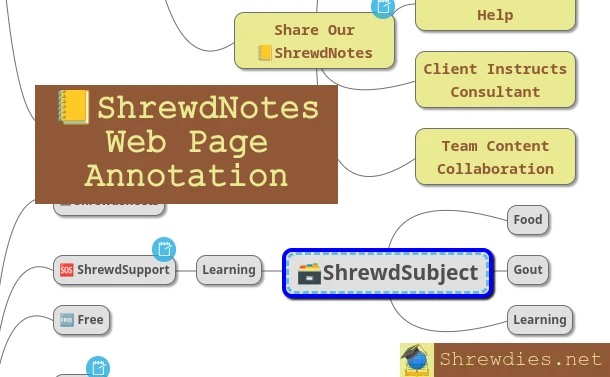Annotate Webpages with 📒ShrewdNotes
This article tells you how I'm using Hypothes.is as a starting point for documentation about 📒ShrewdNotes Web Page Annotation. Because I'm learning how to organize efficient workflows with 📒ShrewdNotes. Then I can be certain that my documentation is accurate for when I get more people involved.
So these are practical notes that guide me. In order to become reference material for anonymous learners, followers, subscribers, and members. Also, these notes can become a framework for Hypothes.is-style 📒ShrewdNotes that I can adapt for Sciwheel and other annotation services.
Hypothes.is Groups and Tags
I use Hypothes.is Groups as follows:
- Public Group for Anonymous Learners.
- 🗃ShrewdSubjects Groups.
- My Private Group.
Public Group for Anonymous Learners
I make most of my Hypothes.is 📒ShrewdNotes in public. Mainly on my own websites. But increasingly whenever I find anything useful or interesting. Especially where I find good content relating to one of my 🗃ShrewdSubjects. So anyone can follow my Public 📒ShrewdNotes.
To recognize 🗃ShrewdSubjects, I use Hypothes.is Tags. Currently, these are Food, Gout, and Learning. Where Learning includes any topic not covered by the other subjects. In this way, as I recognize new subjects, I will separate them from Shrewd Learning.
Note that Public annotations for my subject tags include notes from all Hypothes.is users. So, tags are a great way to collect notes by everyone who is interested in a topic. Also, you can mix and match User, Group, and Tag searches. As well as using free-format search.
Additionally, I've started using Hypothes.is Tags to help me organize my workflows. Currently, I use 4, but I may extend this as I incorporate annotation into my daily life. My current 4 tags are:
New– denotes new content that I'm preparing.Change– denotes changes I plan to make.editing– means that I've saved the note that I'm currently working on. Or that I've forgotten to delete myeditingtag! I use this to avoid losing text as I'm writing it, as Hypothes.is does not have autosave. Though there are ways round that.BuildInPublic– read more at #BuildInPublic.
🗃ShrewdSubjects Groups
Though I like to BuildInPublic, I also like to collaborate. Now, collaboration is possible using public annotation. But I'm trying to create services built around teams. So I've created private groups for each 🗃ShrewdSubject.
Currently, joining these private Hypothes.is groups starts by subscribing to one or more newsletters:
- Foodary Nexus Newsletter
- GoutPal Links Newsletter
- Shrewd Learning Newsletter
My Private Web Annotation Group
I try to do most of my content creation in public. Or in teams. So I only currently have one group for private notes. But Hypothes.is allows you to create as many private groups as you need. Which is useful where you want to keep notes separate. However, I recommend using tags unless you are sure you want separate groups of notes.

Your Annotate Webpages with 📒ShrewdNotes
Which aspects of webpage annotation are you interested in?
Please tell me your webpage annotation story below.
Leave Annotate Webpages with 📒ShrewdNotes to read Keith Taylor's Internet Content Blog.
Annotate Webpages with 📒ShrewdNotes Comments
Please add your comments below.
Your feedback options are:
- Add comments below.
- Create a new issue about any concern that you want to resolve. Or join an existing issue.
- Start a new discussion about any topic that interests you. Or join an existing discussion.
If you are asking a question, it’s best to:
- Search for that question in Keith Taylor's Search Engine first.
- Choose the most relevant result.
- Refer to that result as you ask your question.